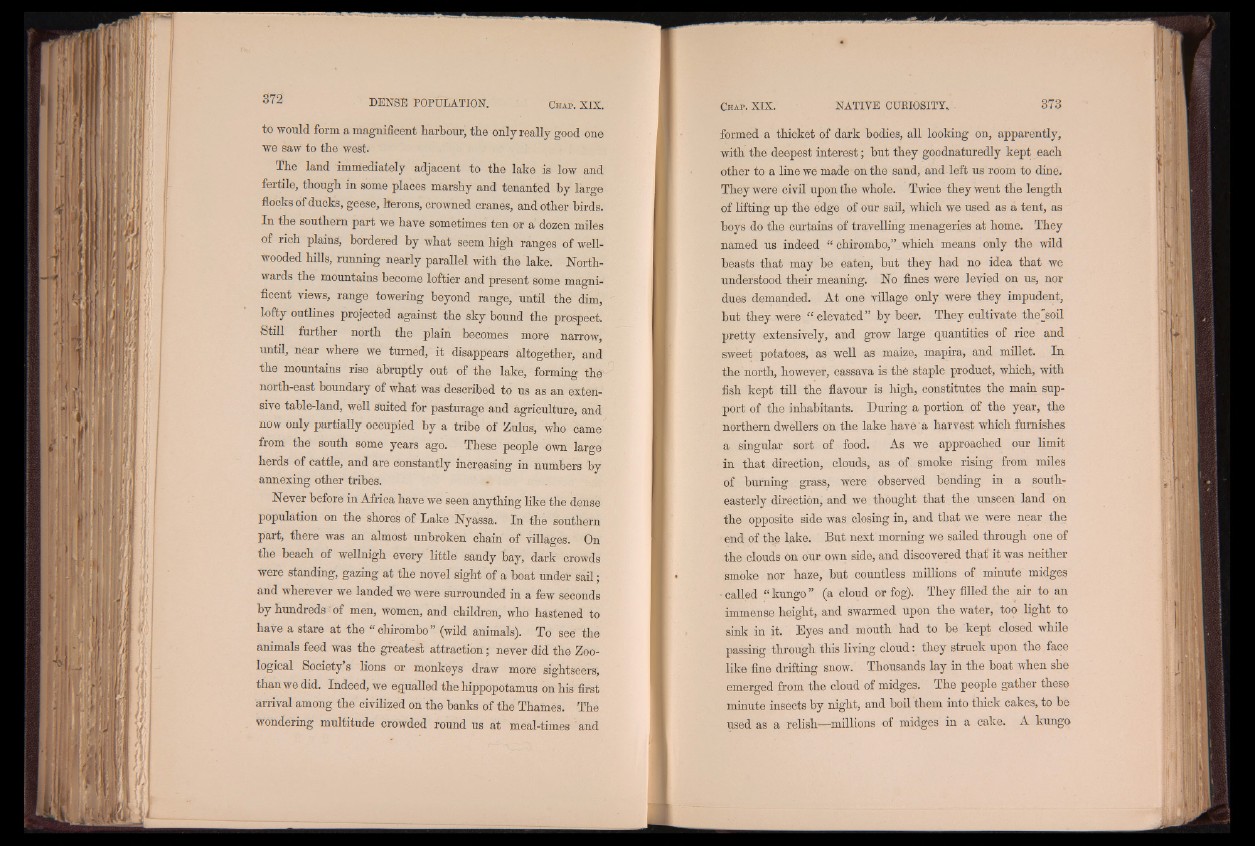
to would form a magnificent harbour, the only really good one
we saw to the west.
The land immediately adjacent to the lake is low and
fertile, though in some places marshy and tenanted by large
flocks of ducks, geese, herons, crowned cranes, and other birds.
In the southern part we have sometimes ten or a dozen miles
of rich plains, bordered by what seem high ranges of well-
wooded hills, running nearly parallel with the lake. Northwards
the mountains become loftier and present some magnificent
views, range towering beyond range, until the dim,
lofty outlines projected against the sky bound the prospect,
fetill further north the plain becomes more narrow,
until, near where we turned, it disappears altogether, and
the mountains rise abruptly out of the lake, forming thé
north-east boundary of what was described to us as an extensive
table-land, well suited for pasturage and agriculture, and
now only partially occupied by a tribe of Zulus, who came
from the south some years ago. These people own large
herds of cattle, and are constantly increasing in numbers by
annexing other tribes.
Never before in Africa have we seen anything like the dense
population on the shores of Lake Nyassa. In the southern
part, there was an almost unbroken chain of villages. On
the beach of wellnigh every little sandy bay, dark crowds
were standing, gazing at the novel sight of a boat under sad ;
and wherever we landed we were surrounded in a few seconds
by hundreds-of men, women, and children, who hastened to
have a stare at the “ chirombo” (wild animals). To see the
animals feed was the greatest attraction ; never did the Zoo-
logical Society s lions or monkeys draw more sightseers,
than we did. Indeed, we equalled the hippopotamus on his first
arrival among the civilized on the banks of the Thames. The
wondering multitude crowded round us at meal-times and
formed a thicket of dark bodies, all looking on, apparently,
with the deepest interest ; but they goodnaturedly kept each
other to a line we made on the sand, and left us room to dine.
They were civil upon the whole. Twice they went the length
of lifting up the edge of our sail, which we used as a tent, as
boys do the curtains of travelling menageries at home. They
named us indeed “ chirombo,” which means only the wild
beasts that may be eaten, but they had no idea that we
understood their meaning. No fines were levied on us, nor
dues demanded. At one village only were they impudent,
but they were “ elevated” by beer. They cultivate the'soil
pretty extensively, and grow large quantities of rice and
sweet potatoes, as well as maize, mapira, and millet. In
the north, however, cassava is the staple product, which, with
fish kept till the flavour is high, constitutes the main support
of the inhabitants. During a portion of the year, the
northern dwellers on the lake have a harvest which furnishes
a singular sort of food. As we approached our limit
in that direction, clouds, as of smoke rising from miles
of burning grass, were observed bending in a southeasterly
direction, and we thought that the unseen land on
the opposite side was closing in, and that we were near the
end of the lake. But next morning we sailed through one of
the clouds on our own side, and discovered that' it was neither
smoke nor haze, but countless millions of minute midges
-called “kungo” (a cloud or fog). They filled the air to an
immense height, and swarmed upon the water, too light to
gink in it. Eyes and mouth had to be kept closed while
passing through this living cloud : they struck upon the face
like fine drifting snow. Thousands lay in the boat when she
emerged from the cloud of midges. The people gather these
minute insects by night, and boil them into thick cakes, to be
used as a relish—millions of midges in a cake. A kungo